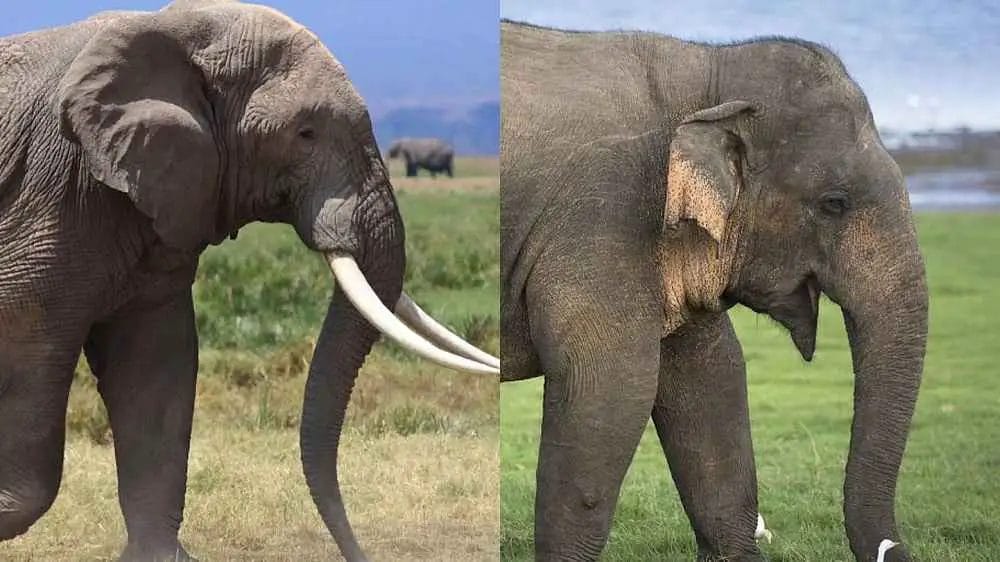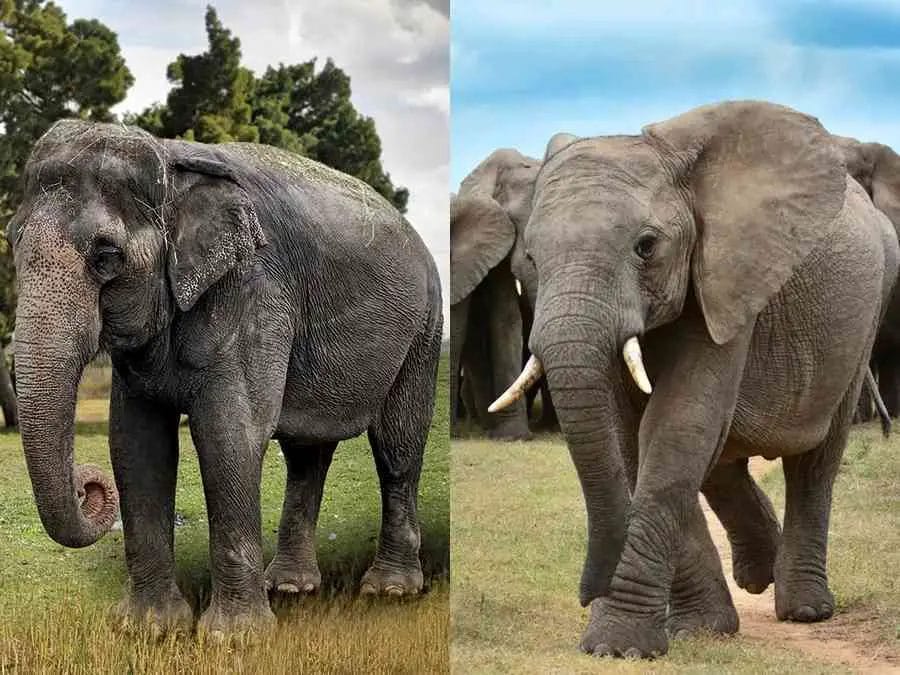The African elephant is generally larger than the Asian elephant. African elephants can weigh up to 6,350 kg (14,000 lbs) and be as much as 4 meters (13 feet) tall at the shoulder, while Asian elephants typically weigh between 2,000-5,500 kg (4,400-12,000 lbs) and reach a shoulder height of 2.5-3 meters (8-10 feet).

Elephants are the largest land animals in the world and are known for their massive size and strength. However, not all elephants are created equal when it comes to size.
African elephants and Asian elephants, the two main species of elephants, have distinct differences in their size and physical characteristics. This article will provide a detailed comparison of the size of African and Asian elephants, as well as the factors that contribute to these differences.
African Elephant Size
African elephants are the larger of the two species, with adult males weighing between 2,300-6,350 kg (5,000-14,000 lbs) and standing up to 4 meters (13 feet) tall at the shoulder. Adult females are slightly smaller, weighing between 2,000-3,500 kg (4,400-7,700 lbs) and standing up to 3.2 meters (10.5 feet) tall at the shoulder.
African elephants are also characterized by their larger ears and tusks, with the largest tusks ever recorded measuring over 4 meters (13 feet) in length.
The largest African elephant ever recorded was an adult male shot in Angola in 1956, which weighed a staggering 6,350 kg (14,000 lbs) and stood 4 meters (13 feet) tall at the shoulder. This record-breaking elephant was also notable for its massive tusks, which measured over 3.9 meters (13 feet) in length.
African elephants are also known for their distinct physical characteristics, such as their long trunks, which are used for grasping and manipulating objects, and their thick gray skin, which helps to protect them from the sun and insect bites.

Asian Elephant Size
Asian elephants are smaller in size compared to African elephants. Adult males typically weigh between 2,000-5,500 kg (4,400-12,000 lbs) and reach a shoulder height of 2.5-3 meters (8-10 feet).
Adult females weigh between 1,300-2,000 kg (2,900-4,400 lbs) and reach a shoulder height of 2-2.5 meters (6.5-8 feet). Asian elephants are also characterized by their smaller ears and tusks, with the largest tusks ever recorded measuring just over 3 meters (10 feet) in length.
Asian elephants are also known for their distinct physical characteristics, such as their smaller, but still very strong trunks, and their more wrinkled skin than African elephants.
Factors Affecting Elephant Size
The differences in size between African and Asian elephants can be attributed to a variety of factors, including genetics, environment, and diet.
Genetics plays a key role in determining an elephant’s size, with African elephants having a larger gene pool than Asian elephants. This genetic diversity leads to larger and stronger elephants.
The environment also plays a role in elephant size. African elephants live in a wide range of habitats, including savannas, forests, and deserts, while Asian elephants are found primarily in tropical forests.
This difference in habitat leads to African elephants being better adapted to survive in harsher conditions, which contributes to their larger size.
Diet is another important factor that contributes to elephant size. African elephants have a more varied diet than Asian elephants, which includes a wide variety of plants, fruits, and vegetables.
This diverse diet provides African elephants with the necessary nutrients to grow larger and stronger.

Conclusion
In this article, we have provided a detailed comparison of the size of African and Asian elephants. African elephants are generally larger than Asian elephants, with adult males weighing between 2,300-6,350 kg (5,000-14,000 lbs) and standing up to 4 meters
(13 feet) tall at the shoulder, while Asian elephants typically weigh between 2,000-5,500 kg (4,400-12,000 lbs) and reach a shoulder height of 2.5-3 meters (8-10 feet). Additionally, African elephants have larger ears, tusks and thicker skin than Asian elephants.
Factors such as genetics, environment, and diet play a significant role in determining the size of elephants. African elephants have a larger gene pool and live in a wide range of habitats, which leads to larger and stronger elephants.
In contrast, Asian elephants are found primarily in tropical forests, and have a less varied diet, which contributes to their smaller size.
It is important to note that size is not the only distinction between African and Asian elephants. Both species have their own unique characteristics, behaviors, and habitats.
Understanding the size differences between African and Asian elephants can provide us with a deeper understanding and appreciation of these magnificent animals.
In conclusion, African and Asian elephants are different in size and physical characteristics, but both are majestic creatures that deserve respect and protection. Further research and study of these animals will help us to gain a deeper understanding of their life and habitat, and to conserve them for the future.
Are African elephants always larger than Asian elephants?
Not always, African elephants are generally larger than Asian elephants, but there can be exceptions depending on the individual elephant. Some Asian elephants may be larger than some African elephants.
The size difference is not always clear-cut and can depend on a variety of factors such as genetics, diet, and environment.
What is the difference in tusk size between African and Asian elephants?
African elephants have larger tusks than Asian elephants. The largest tusks ever recorded on an African elephant measured over 4 meters (13 feet) in length, while the largest tusks ever recorded on an Asian elephant measured just over 3 meters (10 feet) in length.
How do African and Asian elephants differ in terms of their skin?
African elephants have thicker skin than Asian elephants. Their skin is gray and can be up to 1 inch thick, which helps to protect them from the sun and insect bites. On the other hand, Asian elephants have more wrinkled skin and is less thick than African elephants.
Are African and Asian elephants different in terms of their diet?
Yes, African elephants have a more varied diet than Asian elephants. African elephants eat a wide variety of plants, fruits, and vegetables, which provides them with the necessary nutrients to grow larger and stronger.
Asian elephants eat mostly grasses, fruits, and other vegetation, but their diet is less varied than African elephants.
Are African and Asian elephants different in terms of their behavior?
Yes, African and Asian elephants have different behaviors. African elephants are known to be more aggressive and have a more complex social structure than Asian elephants. African elephants also have a longer lifespan than Asian elephants.
On the other hand, Asian elephants are known to be more docile and have a less complex social structure. They also have a shorter lifespan in comparison.
